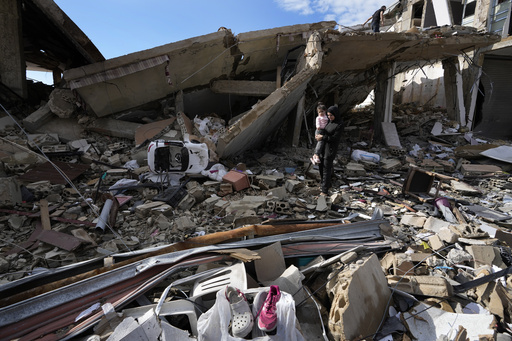
Residents Return to Devastation in Southern Lebanon
In Hanouiyeh, Lebanon, Mariam Kourani, 56, recalls the 37 years spent building a life with her husband, during which they established a butcher shop, initiated a container sales business, and opened a charming restaurant. Sadly, all of their efforts were wiped out in a single strike from Israeli air forces in late September. As she navigates through the ruins of her home and restaurant, she watches her son-in-law gather the belongings of her granddaughter, including clothes and toys that were lost in the rubble. With tears in her eyes, Kourani expresses her grief, declaring, “This was my house, my dreams and my hard work,” while reflecting on losses estimated at around $120,000.
Kourani’s experience mirrors that of many others, as tens of thousands of residents have begun returning to southern Lebanon following a ceasefire mediated by the U.S. that took effect on Wednesday. Following weeks of intense airstrikes, numerous neighborhoods in southern Lebanon, especially in the eastern regions and the Shiite-majority southern suburbs of Beirut, have been devastated. The conflict has displaced close to 1.2 million individuals, forcing them back into communities that have been irrevocably altered.
The World Bank recently indicated that the housing sector has been particularly affected, with nearly 100,000 homes either partially or completely destroyed during the prolonged war escalation that began in late September. The estimated cost of damages now stands at a staggering $3.2 billion, leaving many questioning who will facilitate the reconstruction efforts. Although Iran has extended its assistance offer, their economic challenges due to Western sanctions present complications. Kourani shares that Hezbollah has pledged housing for those displaced while they await the rebuilding of their homes. After incurring considerable rental expenses during her family’s two-month displacement in Qarnayel, Kourani is focused on reopening their butcher shop to regain financial stability.
The theme of loss lingers deeply for local residents. Ali Saleh recounts how he lost his home in the 2006 conflict and managed to rebuild with funding from Qatar. Now, returning to his village near the Israeli border, he discovers his two-story home has once again been obliterated. With a heavy heart, he states, “All the memories are gone,” while reflecting on the repeated traumas experienced by his family.
In the ancient city of Baalbek, known for its UNESCO World Heritage site, 34-year-old Souad al-Outa struggles to process the destruction of her once vibrant neighborhood. When she visited after the airstrikes, the devastation was greater than she expected, including the deaths of her husband’s relatives just a street away. “I feel like my heart has come out of its place,” she laments, recalling the warm memories tied to her children’s bedroom.
Further southwest in Qana, where the family homes lie in ruins, Abu Ahmad Salameh manages to recover items from under the rubble. “All this damage can be rebuilt. This is our land, and we will stay here no matter what,” he affirms. Salameh recalls a heartening moment when Hezbollah fighters unearthed a safe filled with valuables from his house to return to his family following the recent strikes.
Kourani recounts leaving her home on September 23 as the conflict escalated and relocating to a relative’s house nearby. News of her home’s destruction arrived shortly after their departure. As the airstrikes intensified, they fled north and rented an apartment, costing them $1,000 monthly, not including utility bills. Once the ceasefire was in place, she returned home with her family, still processing the devastation surrounding them. She hesitates to focus on personal losses at such a tragic moment when many lives have been lost, including friends and loved ones. “Israel has filled our land with blood. Our big loss is our men,” Kourani reflects somberly.
